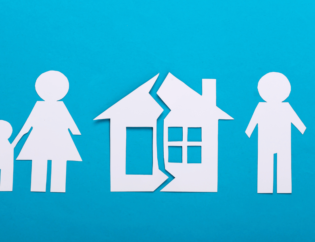
I. Introduction
A. Overview of the Emotional Journey of Divorce
Divorce can be a challenging and complex process that affects both individuals involved. The emotional journey of divorce is often filled with anger, sadness, fear, and guilt. This journey can be further complicated by divorce's legal and practical aspects, such as property division, child support ,child custody, and financial planning. Navigating the journey of divorce requires understanding and coping with the emotions involved.
B. Importance of Understanding and Coping with the Emotions Involved
The emotions involved in a divorce can significantly impact a person's well-being and affect their ability to move forward. Understanding emotions and learning how to cope with them is an important step in the healing process. It is also important to recognize that everyone's journey is unique and that there is no right or wrong way to feel during this time. By acknowledging and addressing the emotions involved, individuals can begin healing and move forward with hope and resilience.
In this blog post, we will explore the emotional journey of divorce and offer practical tips and advice for coping with the emotions involved. Whether you are currently going through a divorce or have recently gone through one, this post aims to provide a comprehensive guide to help you navigate the emotional journey and find peace and closure.
II. The Stages of Grief in Divorce
A. Denial
The first stage of grief in divorce is often denial. This can manifest as a disbelief that the marriage is ending or a feeling of numbness towards the situation. During this stage, individuals may try to ignore the reality of the problem and may struggle to accept the changes happening.
B. Anger
The next stage is anger. This emotion can be directed toward the spouse, the situation, or oneself. It is common for individuals to feel angry about the end of the marriage and the loss of the life they had planned. Feelings of frustration and resentment can also accompany this anger.
C. Bargaining
The third stage is bargaining. During this stage, individuals may try to find ways to save the marriage or find a solution to the problems that led to the divorce. This may involve making promises or making compromises to reconcile.
D. Depression
The fourth stage of grief is depression. This can manifest as sadness, hopelessness, and a lack of energy. During this stage, individuals may struggle with feelings of loss and difficulty moving forward.
E. Acceptance
The final stage of grief in divorce is acceptance. This is when individuals begin to accept the reality of the situation and move forward with their lives. They may focus on personal growth and creating a new life for themselves.
F. Explanation of How these Stages May Play Out During Divorce
It is important to note that these stages of grief are not linear, and individuals may experience them in a different order or revisit stages multiple times. Additionally, some individuals may skip stages or experience only some of them. The emotional journey of divorce is unique to each person. Various factors, such as the reason for the divorce, the length of the marriage, and the support available, can influence it. However, understanding these stages can provide a framework for what to expect and help individuals navigate the emotional journey with greater awareness and understanding.
III. Coping with Negative Emotions: Anger, Sadness, and Fear
A. Understanding the Root Causes of Negative Emotions
Negative emotions such as anger, sadness, and fear are a normal part of the journey. Emotions can be rooted in the loss of the relationship, the planned future, and the uncertainty of what lies ahead. Understanding the root causes of these emotions can help individuals better manage them.
B. Strategies for Managing Anger, Sadness, and Fear
Managing negative emotions can be challenging, but several strategies can be helpful. These include:
- Practicing self-care: Engaging in activities that promote physical and emotional well-being can help manage negative emotions and improve overall mood.
- Talking to a trusted friend or family member: Reaching out to a supportive person can provide comfort and help process emotions.
- Seeking professional help: A therapist or counselor can provide guidance and support for managing negative emotions.
- Engaging in physical activity: Exercise has been shown to impact mental health positively and can be a helpful tool for managing negative emotions.
- Journaling: Writing down thoughts and feelings can provide a release and help process emotions.
C. The Importance of permitting Yourself to Feel These Emotions
It is important to permit yourself to feel the emotions that arise during divorce. Trying to suppress or ignore feelings can lead to further stress and anxiety. Individuals can heal and move forward by acknowledging and addressing their emotions. It is also important to be kind and patient with oneself during this time and recognize that the journey to healing and closure is a process that takes time.
IV. Finding Support: Surrounding Yourself with a Positive Network
A. The Benefits of Having a Support System During Divorce
Having a solid support system is crucial during the emotional journey of divorce. A support system can provide comfort, encouragement, and a sense of community during an isolating and challenging time. A positive network of friends, family members, or support groups can help individuals navigate the difficulties of divorce and provide a source of strength and resilience.
B. Ways to Build a Support Network
Building a support network can be done in a variety of ways, including:
- Reaching out to friends and family members: Talking to trusted individuals about your experience can provide a sense of connection and support.
- Joining a support group: Support groups can provide a sense of community and a safe space to discuss experiences and emotions.
- Participating in social activities: Engaging with others can provide a sense of connection and a break from the stress of divorce.
- Volunteering: Volunteering can provide a sense of purpose and a new network of supportive individuals.
C. The Importance of Reaching Out for Help When Needed
Reaching out for help when needed is an essential aspect of the emotional journey of divorce. It can be challenging to ask for help, but doing so can provide much-needed support and alleviate feelings of stress and isolation. Whether talking to a trusted friend, seeking the aid of a therapist or joining a support group, reaching out for help can be a valuable step in the journey toward healing and closure.
V. Self-Care During the Divorce Process
A. The Importance of Taking Care of Your Physical and Emotional Health
Self-care is an important aspect of the emotional journey of divorce and is essential for maintaining physical and emotional well-being. During this time, it is important to prioritize self-care and create a routine that includes activities that promote physical and emotional health.
B. Examples of Self-Care Activities
There are a variety of self-care activities that individuals can engage in, including:
- Exercise: Engaging in physical activity, such as yoga or running, can improve mood and reduce stress.
- Relaxation techniques: Meditation or deep breathing practices can help manage stress and improve mental well-being.
- Healthy eating: Eating a balanced diet can improve physical health and provide energy to tackle the challenges of divorce.
- Creative pursuits: Engaging in creative activities, such as https://ghostwriter-projektarbeit.de/, can release emotions and a sense of accomplishment.
- Spending time in nature: Taking walks or spending time in nature can provide a sense of peace and tranquility.
C. The Connection Between Self-Care and Healing
Self-care and healing are interconnected. By taking care of themselves, individuals can begin to heal from the emotional toll of divorce and build resilience for the future. Engaging in self-care activities can also improve overall mood, reduce stress, and provide control during a time of change and uncertainty. Making self-care a priority during divorce can be essential to a healthier, happier future.
VI. Moving Forward: Finding Closure and Healing
A. Letting Go of the Past and Embracing the Future
Moving forward after divorce requires letting go of the past and embracing the future. This can involve letting go of negative feelings towards the marriage and the spouse and focusing on personal growth and self-discovery. By letting go of the past, individuals can begin to heal and create a new life for themselves.
B. Finding Closure and Moving On from the Marriage
Finding closure and moving on from the marriage is an important aspect of the hausarbeit schreiben lassen preise. This can involve finding a sense of resolution and acceptance and letting go of the relationship. This closure can come from various sources, including therapy, support groups, or personal reflection.
C. The Journey of Healing and Personal Growth
The emotional journey of divorce is a journey of restoring and personal growth. By taking care of themselves, finding support, and letting go of the past, individuals can heal from the emotional toll of divorce and build resilience for the future. The journey of healing and personal growth can be challenging, but by taking it one step at a time, individuals can find peace and closure and create a new life filled with hope and possibility.
VII. The Importance of Professional Help: Therapists, Counselors, and Support Groups
A. Overview of the Benefits of Professional Help
Professional help, such as therapy or counseling from the divorce coach, can be an important aspect of the process. A therapist or counselor can provide a safe space to discuss emotions, offer practical advice and coping strategies, and support during difficult times. Therapy can also help individuals work through any underlying emotional issues and promote healing and personal growth.
B. When to Seek Help from a Professional
It is important to seek help from a https://masterarbeit-ghostwriter.de/ when needed. This may be during the divorce process or after it has been finalized. Some individuals may benefit from therapy or counseling even if they are not experiencing significant emotional distress, as treatment can provide a space for self-reflection and growth. If feelings of sadness, anger, or anxiety persist or interfere with daily life, it may be necessary to seek professional help.
C. Finding the Right Professional for Your Needs
Finding the right professional for your needs can be a process of trial and error. It is important to find a therapist or counselor who is a good fit and with whom you feel comfortable discussing personal and sensitive topics. Consider factors such as the therapist's approach, experience, and specialties when deciding. It is also important to remember that therapy can take time to be effective and that it may take a few sessions to find the right fit.
VIII. Conclusion
A. Reflection on the Emotional Journey of Divorce
The whole journey of divorce is a complex and challenging process that requires understanding, coping skills, and support. By recognizing the emotions involved and learning to manage them, individuals can begin repairing and move forward with a sense of hope and resilience.
B. Encouragement for Moving Forward with Hope and Resilience
While the entire journey can be difficult, it is important to remember that curing and finding peace are possible. By taking care of themselves, seeking support, and embracing the future, individuals can find closure and create a new life filled with hope and possibility.
C. Final Thoughts on Coping with the Emotions of Divorce
The emotional journey of divorce is unique to each individual. Still, by understanding and managing the emotions involved, individuals can begin to heal and move forward with greater ease and resilience. Whether through self-care, support from loved ones, or professional help, many resources are available to help individuals navigate the divorce process and find peace and closure.









